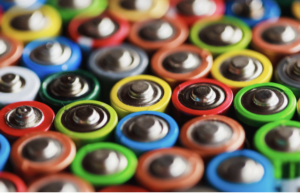Study: Battery Waste – Growing Volume, Dangers, and Responsibility
The number of electronic devices with batteries in households has remained stable or even increased in recent years. However, managing their waste continues to present challenges. A recent study reveals that although most people understand the environmental and health hazards posed by battery waste, only a portion of them actively take steps to dispose of such waste properly.
Electronic waste has been the fastest-growing waste category globally for several years, and its associated dangers are becoming increasingly relevant in Lithuania as well. A recent United Nations report highlights that the amount of electronic waste is growing five times faster than the rate of recycling. In 2022, the world generated 62 million metric tons of electronic waste—equivalent to over 1.5 million truckloads, enough to circle the Earth’s equator. By 2030, this number is projected to reach 82 million tons. Still, less than a quarter—only 22.3%—of this waste is recycled. For small devices like toys or e-cigarettes, the recycling rate is even lower at just 12%.
“The growing volume of improperly managed electronic waste poses a real threat to the environment and public safety. Waste containing embedded lithium batteries is especially dangerous and has been one of the causes of several major fires in Lithuania’s recycling facilities in recent years,” says Linas Ivanauskas, head of the Electronics Distributors Association (EPA).
Battery Boom or Stability?
Consumers are increasingly questioning how many batteries they have at home and how these devices are changing their daily habits. A majority of respondents (48%) say that the number of household devices with batteries has remained about the same over the past three years. Meanwhile, 36% report a slight increase, indicating a gradual penetration of technology into everyday life. Notably, 10% of respondents claim the number of such devices has at least doubled—already signaling a significant shift. In contrast, 7% noted a decrease, possibly linked to a desire for more durable products.
In summary, the household battery “ecosystem” is not shrinking—and in some cases, is growing rapidly. This means that attention to sorting and proper disposal must grow along with the quantity. The more batteries in our environment, the greater our responsibility to handle them properly.

Not Fear, but Incentives Drive Action
When asked what would most motivate people to responsibly dispose of used batteries, responses varied. The majority (53%) chose incentives—such as discounts or small rewards—indicating that practical benefits remain a strong driver for behavior change. Another 38% suggested more education about the harmful effects of batteries so that people truly understand the environmental impact of improper disposal. Additionally, 17% supported emotional impact through awareness campaigns that clearly show the damage done to nature. Interestingly, only 6% favored legal measures such as regulations or fines—suggesting that positive motivation is still more effective than strict control. If we want people to act responsibly, investing in motivation pays off better than punishment.
Risk – Not Just to the Environment
Three out of four respondents (75%) believe that used batteries should be disposed of in special containers due to environmental or fire hazards. This figure shows growing public awareness. Additionally, 53% highlighted the danger to human health posed by improperly stored or discarded batteries. 40% pointed out that recycling batteries helps return valuable materials to the production cycle. Equally important, 22% emphasized conserving non-renewable resources. Only 6% still do not see battery disposal as important, indicating that the need for information campaigns remains.
All these numbers send a clear message: batteries are not trivial waste. They require responsibility, informed decisions, and conscious action.
Convenient Battery Collection System Established
The Electronics Distributors Association (EPA) actively encourages the public to responsibly manage electronic waste. Special collection containers for small electronic waste can be found in shopping centers, libraries, and various cultural, educational, and administrative institutions.
For over ten years, EPA has been offering free collection of large household appliances such as refrigerators, washing machines, dishwashers, and range hoods directly from people’s homes. To schedule a pick-up, residents can call +370 695 55111 or visit the website:
👉 https://epa.lt
The site also lists all electronic waste drop-off locations.
“We want to encourage people to understand that every improperly discarded battery poses a risk to the environment or could even cause a fire. That’s why we urge residents to act responsibly and choose safe disposal methods—it’s easy, convenient, and extremely important,” says Linas Ivanauskas.
About the Study
The study on battery waste management was conducted in April 2025 by the market and public opinion research company Spinter tyrimai. A total of 1,019 respondents aged 18–75 participated in the survey.
About the Electronics Distributors Association (EPA)
The Electronics Distributors Association (EPA) is the largest licensed organization in Lithuania for the collective management of electrical and electronic equipment waste. It unites several hundred international and national producers and importers of electrical and electronic equipment, including world-renowned brands such as Bosch, Siemens, Whirlpool, and others. EPA operates on a national scale and finances waste collection throughout the country.